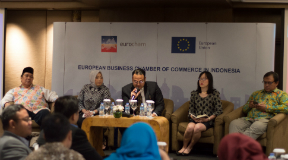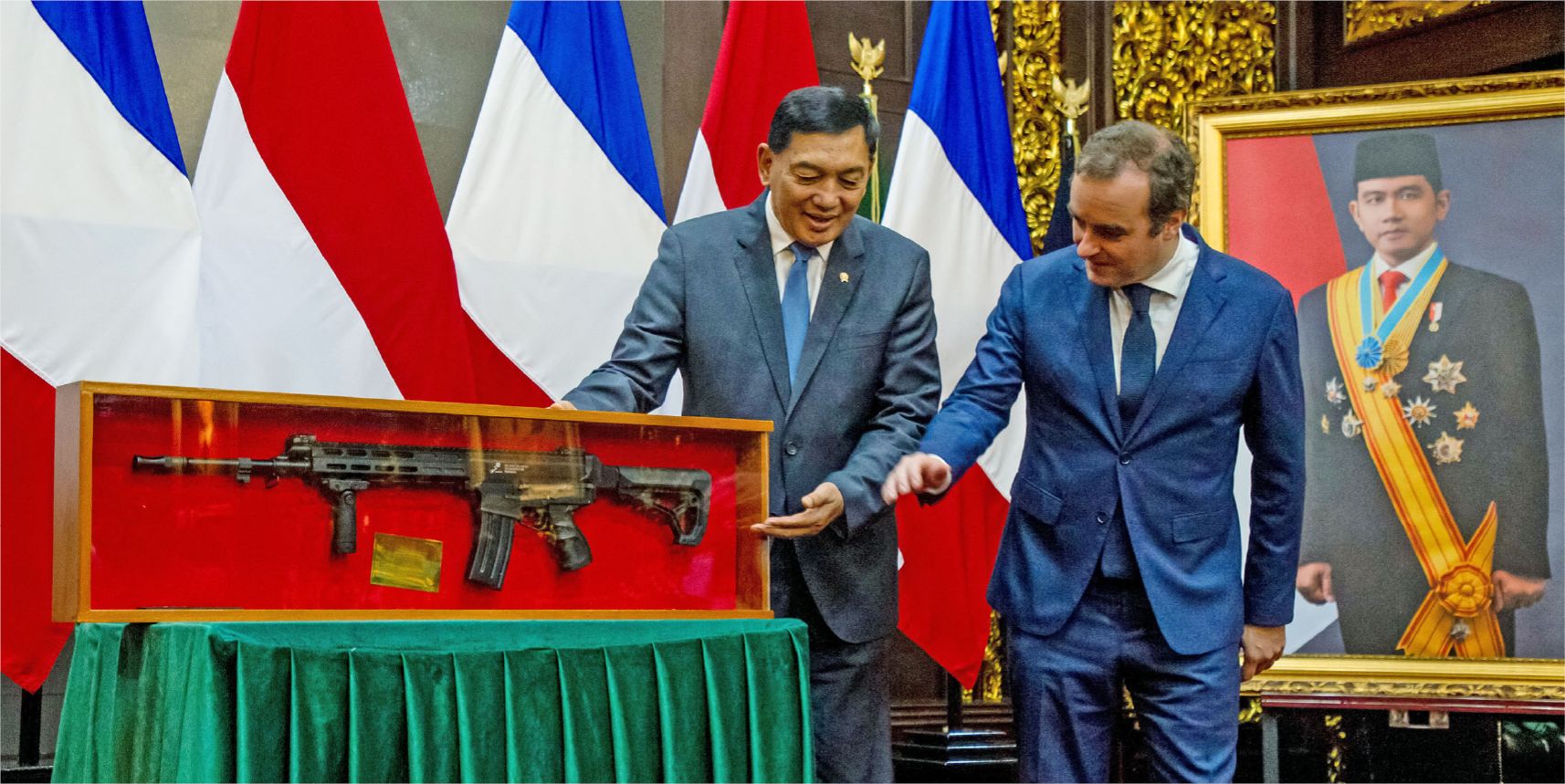
Late the night: Fireworks mark Jakarta’s 498th anniversary celebration on Sunday at Lapangan Banteng Square in Central Jakarta (Antara/Muhammad Adimaja).
President Prabowo Subianto recently revived a long-standing national discourse on the construction of a giant sea wall along Java’s Northern coastline. This project has been on th National Development Planning Agency (Bappenas) agenda since 1995.
Jakarta Bay has been identified as the core site, with the President emphasizing the need for synergy between central and regional governments, particularly encouraging the Jakarta provincial government to consider contributing funding for the project’s initial phase. Prabowo’s narrative for this project signifies not only an ambitious national infrastructure agenda but also a powerful message: This megacity is here to stay.
That message subtly differs from the spirit behind the development of Indonesia’s new capital Nusantara. The government has long promoted Nusantara as a symbol of equitable development and the nation’s future. Advocates for the capital relocation have cited Jakarta’s complex urban challenges, such as chronic flooding, traffic congestion, and over-urbanization, as reasons to shift the political center elsewhere.
However, moving the capital is not a short-term endeavor. While initial construction has begun, the relocation of essential government functions, the development of supporting infrastructure and the formation of a complete social and economic ecosystem will take decades to establish. Still, the government expresses confidence that Nusantara will become Indonesia’s political center by the end of 2028, as budget allocation for its next construction phase, for the 2025-2029 period, has been secured. Thus, Nusantara will continue to progress, regardless of its pace.
Despite the various dynamics at play, one significant question repeatedly arises: Once Nusantara is officially established, will Jakarta truly be left behind? The most reasonable answer at this point is, “Not a chance.”
At nearly five centuries old, Jakarta has not only embodied the nation’s history but has also evolved into the epicenter of economic, governmental, and cultural dynamics. Its modern infrastructure, including the MRT and LRT systems, inner-city toll roads, Soekarno-Hatta International Airport, and Tanjung Priok Port, clearly demonstrates its role as a global city. For a long time, Jakarta has been Indonesia’s economic powerhouse, hosting over 70 percent of the country’s monetary circulation and contributing more than 17 percent to the national gross domestic product (GDP). Its dynamic, diverse, and intellectually driven population has long fueled national growth.
Furthermore, it is home to the headquarters of state-owned enterprises, multinational corporations, foreign embassies, and international organizations. This economic centrality cannot be easily replaced by a city built from scratch. Even so, this vitality exists alongside deeply rooted urban challenges. Congestion, pollution, floods, and social inequality continue to weigh on the city’s livability and long-term sustainability.
Indonesia can look to other countries for parallels. In Australia, Canberra serves as the administrative capital, while Sydney, which previously held that role, remains the commercial, financial, and cultural hub. Similarly, Brazil moved its capital from Rio de Janeiro to Brasília, but Rio continues to thrive as a major center of culture and tourism. Likewise, in the United States, Washington D.C. governs, while New York City leads in finance and global culture.
Jakarta is poised to assume a similar role. Freed from the pressures of being the political capital, the city can now concentrate on becoming a more livable urban center. The sea wall project reflects Jakarta’s repositioning for the future. The full-scale megaproject is planned to stretch more than 900 kilometers from Cilegon in Banten to Gresik in East Java, with an estimated cost of around Rp1,297 trillion (US$80 billion) to be completed over 15 years.
The project is more than just an engineering feat; it is a statement of intent. While critics have raised valid concerns about its environmental risks, social impacts, and enormous price tag, the sheer scale of this project signals that Jakarta is not being abandoned. On the contrary, it shows that Jakarta remains central to Indonesia’s future plans.
If executed responsibly, with proper environmental safeguards and community consultation, the sea wall will not only provide protection from tidal flooding and rising sea levels but also serve as a foundation for Jakarta’s transformation into a smarter, more resilient, and globally competitive metropolis. Cities like New York and Rotterdam have made similar bold infrastructure bets to defend against the realities of the climate crisis. Jakarta is now following suit, because its story is far from over.
Both the government and the broader public should view the capital relocation as a strategic opportunity. It is a chance for Jakarta to reinvent itself, not only as a business capital for the elite, but as an inclusive city for all. That means investing in affordable and accessible public transportation, expanding green and open public spaces, and ensuring that urban development benefits not just the privileged few, but everyone.
One thing is clear: Over the next five, 10, or even 20 years, Jakarta, a city that just marked its 498th anniversary, will remain the beating heart of Indonesia, both economically and socially. The relocation of the capital should not be interpreted as a replacement but as an expansion and functional diversification. Jakarta and Nusantara can grow side by side, fulfilling complementary roles.
Jakarta will remain Indonesia’s window to the global economy and connectivity, while Nusantara develops as a new center of governance and a symbol of sustainability. In short, Jakarta is not going anywhere. It remains irreplaceable, simply entering its next chapter.*
Muhammad Abqori Gunawan is an analyst at Kiroyan Partners, a public affairs company. The views expressed are personal.
Source: The Jakarta Post, June 28, 2025.
Download the clipping here.



